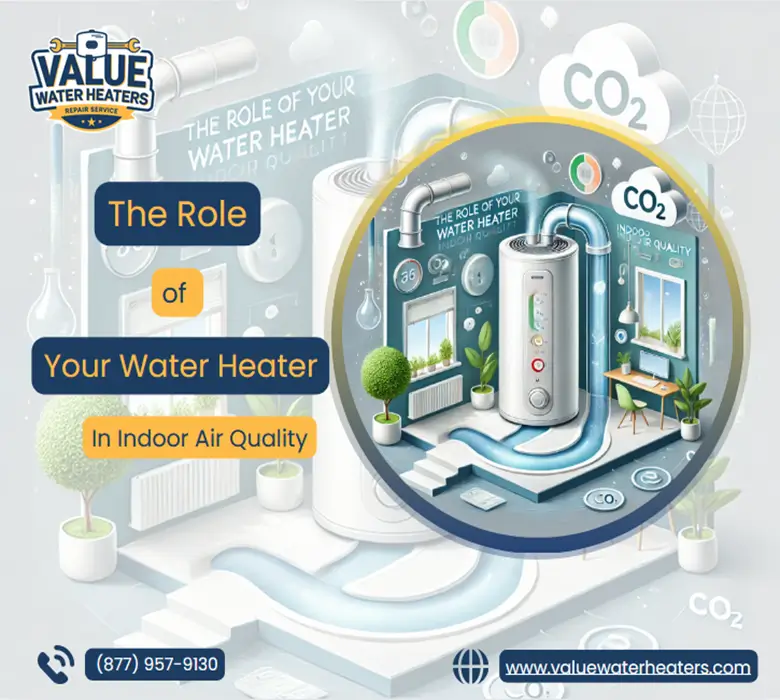Understand how your water heater impacts indoor air quality. Learn about common issues like carbon monoxide leaks, humidity control, and maintenance tips to ensure a safe and healthy home environment.
When thinking about indoor air quality, most people focus on air purifiers, ventilation, or HVAC systems. However, your water heater also plays a crucial role in maintaining a healthy indoor environment. Issues such as carbon monoxide leaks, excessive humidity, or improper ventilation can directly affect the air you breathe. At Value Water Heaters, we believe in helping homeowners understand how their water heaters impact their home’s air quality and how to address potential risks.
How Your Water Heater Affects Indoor Air Quality:
1. Carbon Monoxide Emissions
- Gas-Powered Water Heaters: If not properly vented, gas water heaters can release carbon monoxide (CO), a dangerous and odorless gas. A malfunctioning exhaust or clogged vent can lead to CO buildup, which is hazardous to health.
- Solution: Install a carbon monoxide detector near your water heater and schedule regular inspections to ensure the venting system is working efficiently.
2. Humidity Levels
- Water heaters can contribute to excessive indoor humidity, especially if there are leaks or if the heater is located in an enclosed space without proper ventilation. High humidity can encourage mold and mildew growth, impacting respiratory health.
- Solution: Ensure your water heater and surrounding areas are free of leaks and that the space is well-ventilated.
3. Ventilation Systems
- Poor ventilation in water heaters can result in backdrafting, where harmful gases re-enter your home instead of being expelled outside.
- Solution: Regularly inspect and maintain your water heater’s flue and ventilation systems to ensure gases are properly vented outdoors.
4. Hot Water Quality
- Mineral Buildup: Over time, sediment can accumulate in the tank, potentially affecting water quality. While this doesn’t directly impact air quality, poor water quality can lead to secondary issues, such as bacterial growth in humidifiers or other systems connected to your water heater.
- Solution: Flush your water heater annually to reduce sediment buildup and maintain water quality.
Maintenance Tips to Protect Air Quality:
- Schedule Routine Inspections: Regular maintenance by professionals can detect leaks, faulty components, or venting issues before they become a problem.
- Upgrade to Modern Systems: Energy-efficient and tankless water heaters produce fewer emissions and improve air quality.
- Monitor for Leaks: Check for visible leaks around the water heater and repair them promptly to prevent moisture issues.
- Ensure Proper Ventilation: Keep the area around your water heater free of clutter to allow air circulation.
When to Call the Professionals at Value Water Heaters:
If you suspect your water heater is compromising your indoor air quality, don’t wait. At Value Water Heaters, we specialize in:
- Water Heater Repair: Fixing leaks, venting issues, and carbon monoxide risks.
- Water Heater Replacement: Installing modern, energy-efficient units for better safety and air quality.
- Water Heater Installation: Ensuring proper setup to prevent air quality problems from the start.
Your water heater does more than provide hot water—it can also influence the air quality in your home. By addressing potential issues like emissions, humidity, and maintenance, you can create a healthier environment for your family. Trust Value Water Heaters to ensure your system operates safely and efficiently. Contact us today to schedule a professional inspection or service!




No comment